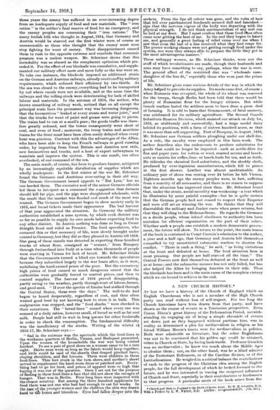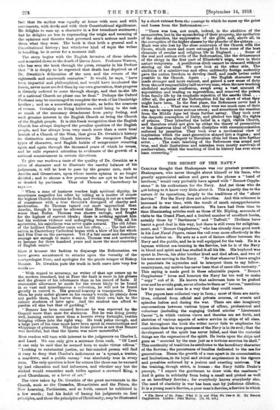A NEW CHURCH HISTORY.*
AT last we have a history of the Church of England which an English Churchman who is not a member of the High Church party can read without loss of self-respect. For too long tho Church historians have been drawn from that party, and have shown us the course of events in a Tractarian perspective. Even Canon Dixon's great history of the Reformation Period, notwith- standing its engaging air of being a simple chronicle of events set down just as they happened without partisan bias, was in reality as determined a plea for mediaevalism in religion as his friend William Morris's tracts were for mediaevalism in politics. Both were admirable as literature, but the sober Englishman was not to be convinced that his golden age could be attained, either in Church or State, by facing backwards. Professor Gwatkin was no mediaevalist ; he knew too much about the Middle Ages to idealize them ; nor, on the other hand, was he a blind admirer of the Protestant Reformers, or of the Caroline divines, or of the Latitudinarians. He weighed in a critical balance the contributions of each to the progress of the Christian idea among the English people, for the full development of which he looked forward to the future, and he was interested in tracing the reciprocal influences of Church and State, especially in their contributions or hindrances to that progress. A particular merit of the book arises from the • Church and State in England to the Death of Qffeeli Anne. By Ii. Gwatkin, D.D. With a Preface by E. W. Watson, D.D. Lenden ; aosemanased Co. Lisa sew
fact that its author was equally at home with men and with movements, with deeds and with their Constitutional significance. He delights to sum up a character in a few trenchant sentences; but he delights no less in expounding the origin and meaning of the opinions and theories that governed men's actions and made them what they were. The book is thus both a general and a Constitutional history ; but whichever kind of topic the writer is handling, he is never for a moment dull.
The story begins with the English invasion of these islands, and is carried down to the death of Queen Anne. Professor Watson, who has seen the book through the press, remarks in his Preface that " it is deeply to be regretted that death has deprived us of Dr. Gwatkin's delineation of the men and the events of the eighteenth and nineteenth centuries." It would, he says, " have been impartial and philosophical, and would have inculcated the lesson, never more needed than by our own generation, that progress is divinely ordered to come through change, and that inethe life of a national Church no phase can be final." Perhaps the Oxford Professor may be encouraged to complete the work of his Cambridge brother ; and on a somewhat ampler scale, as befits the nearness of events. Certainly no living historian could bring to the task so much of the necessary detachment from party feeling, and such genuine interest in the English Church as being the Church of the English people. It is this frank recognition that the English Church has always displayed the peculiar qualities of the English people, and has always been very much more than a mere local branch of a Church of the West, that gives Dr. Gwatkin's history its distinction among Church histories. He recognizes English types of character, and English habits of compromise recurring again and again through the thousand years of which he treata, and he calls repeated attention to evidences of the growth of a national consciousness in certain directions.
To give our readers a taste of the quality of Dr. Gwatkin as a critic of character and to illustrate the careful balance of his judgments, it will be best to pass by the greater men, such as Anselm and Grosseteete, upon whose merits opinion is no longer divided ; and to choose a few persons who are apt to be lauded or decried by partisans. Thus of Thomas of Canterbury he says When a man of business reaches high spiritual dignity, he sometimes magnifies his office by taking as a matter of course the highest Church doctrine he finds, and working it out as a matter of oonsoience with a true theorist's disregard of charity and moderation. So Thomas turned out more 'unpractical than Anselm, though it must be allowed that Henry in hisfury was worse than Rufus. Thomas was sincere enough, and fought for the highest of current ideals ; there is nothing against him but his reckless violence and unforgiving temper. With all his austerities, his saintliness was never quite natural. The old Adam of the brilliant Chancellor came out too often. . . . The last alter- cation in Canterbury Cathedral began with a blow of his fist which laid Fitz Ursa on the pavement. Yet if a fair cause and dauntless courage are enough to make a saint, Thomas was not unworthy to become for three hundred years and more the most renowned of English saints."
Since it became the fashion to disparage the Reformation we have grown accustomed to attacks upon the veracity of the martyrologist Foxe, and apologies for the gentle temper of Bishop Bonner. Dr. Gwatkin puts the truth in both oases into very few worth With regard to accuracy, no writer of that age comes up to the modern standard, but in Foxe the fault is more in his glosses and the glosses of his informants than in his record of facts. If reasonable allowance be made for the errors likely to be found in so vast and miscellaneous a collection, he will not be found greatly to exceed it. His general honesty is transparent. Even when he puts unfair glosses on his enemy's words, he plainly does not garble them, but leaves them to tell their own tale to the calmer students of later ages. And the student can afford to pardon ell sins but that of garbling."
" Bonner has been excused because he was reproved by the Council more than once for slackness. But he was doing pretty well, burning rather more than a heretic every fortnight, besides bringing others into the right way. He took pains enough, and a large part of his time must have been spent in examinations and whippings of prisoners. What the letter proves is not that Bonner was merciful, but that the Queen was more unmerciful."
Most readers will turn with interest to the judgments on Charles L and Laud. We can only give a sentence from each. " Of Laud it can only be said that he seemed born to make virtue odious."
Looking to substantial justice, no fair-minded person will find
it easy to deny that Charles's indictment as ' a tyrant, a traitor, a murderer, and a public enemy ' was absolutely true in every
item. The only question is how far crimes like these can be excused by bad education and bad influences, and whether any but the wicked would remember such trifles against a crowned King, a good Churchman, or a lover of art."
The view taken by Dr. Gwatkin of the great movements in the Church, such as the Crusades, Monasticism and the Friars, the New Learning, Puritanism, and so forth, cannot be exhibited in a few words ; but his habit of basing his judgments on first principles, and those the principles of Christianity, may be illustrated by a short extract from the passage in which he sums up the gains and losses from the Reformation :— " There was loss, not much, indeed, in the abolition of the monasteries, but in the squandering of their property, the spoliation of the churches, the suppression of the gilds, and, above all, in the corruption of the higher classes by the plunder of the abbeys.... Much was also lost by the close connexion of the Church with the Crown, which more and more estranged it from some of the best
elements of secular and religious life in England. . . Some of the real and serious evils of the Reformation, like the debasement of the clergy in the first part of Elizabeth's reign, were in their nature temporary. A pestiferous ditch cannot be cleansed without stirring up the mud. We now look at the other side. The abolition of a mischievous and often unfriendly foreign authority gave the nation freedom to develop itself, and made better order possible in the Church. Again . . . the English character was made stronger and more earnest, and gained a new sense of duty from the new responsibility laid on everyman, when the new teaching abolished auricular confession, swept away a vast amount of superstition and trading on superstition, and removed the poison from family life by its emphatic, rejection of the aseetlo ideal- . . . After all, the gains of the Reformation fell far short of what they might have been. In the first place, the Reformers never had a free hand. . . . What was worse, they were too much men of their own age to escape some serious errors ; and sometimes the reaction from the Middle Ages led them further astray. They took over the despotic conception of Deity, and pitched too high the rights of princes. They inherited the belief in a rigid, visible Church, and therefore could not give up either the theory of persecution or the disastrous ideal of Church discipline with excommunication enforced by penalties. They took over a mechanical view of inspiration which the next generation shaped into a dogma ; and the reaction from allegory to literalism often led them into further error.. . The main teaching of the Reformers was sound and true, and their limitations and mistakes were mostly survivals of mediaevalism, which the teaching of God in history has ever since been correcting."



























 Previous page
Previous page